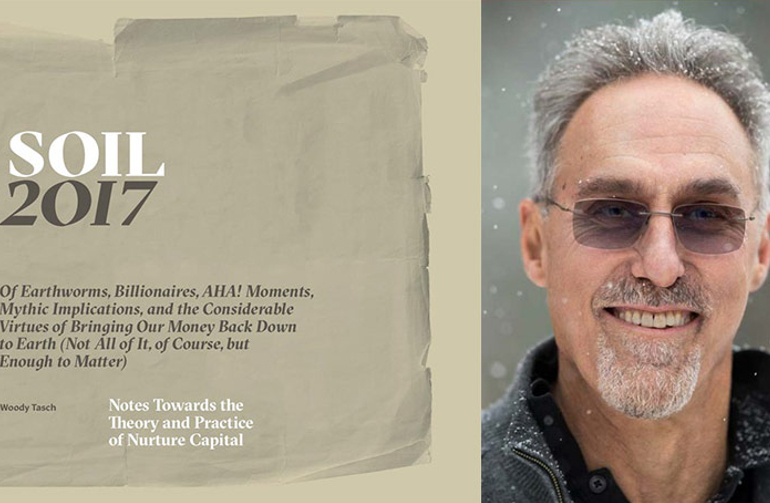This excerpt is reprinted from SOIL: Notes Towards the Theory and Practice of Nurture Capital by Slow Money founder Woody Tasch.
Imagination.
We can’t all be Noam Chomsky or Ayn Rand or Wendell Berry or Bingo Pajama,¹ but that doesn’t mean each and every one of us can’t get the hint. We need a new story. Maybe even a new myth. We need to rediscover imagination.
Imagination that enables us to reckon our whereabouts in a world that is heating up and speeding up. Imagination that enables us to find our way past shallow punditry, tribal vitriol, global this and cyber that, past the hyper and the ultra and the mega. Imagination that leads us back to one another, to the places where we live, and to the land—not just the land of “this land is your land, this land is my land,” but also the soil itself, upon which all life depends.
Imagination.
My own journey in this direction has been catalyzed over the past decade by interactions with thousands of folks in Slow Money meetings, large and small, in dozens of communities.² It felt to me, at the outset, that we would do well to listen more to farmers and poets and less to CEOs and economists. Now, I’m ready to double down.
I’ll see your tweets, your big data, your Dow Jones Industrial Average, your political outrage of the day, and raise you thousands of csas,³ millions of organic beets, and a healthy dose of literary imagination, or, more specifically, some Thomas Mann, or, more specifically than that, some Hans Castorp, the protagonist in Mann’s 1924 novel The Magic Mountain, which evoked Europe on the eve of the First World War. Surrounded by questions of civilization and decay, disease and health, Castorp has the epiphany of all epiphanies. Lost and exhausted in an Alpine snowstorm, it comes:
For the sake of goodness and love, man shall
let death have no sovereignty over his thoughts.
Castorp found himself in a fictional blizzard; today, we are lost in a blizzard of the virtual and the fake.
Try this: Where Castorp says death, substitute terrorism or Twitter or, even… Twinkies.
For the sake of goodness and love, man shall
let terrorism have no sovereignty over his thoughts.
For the sake of goodness and love, man shall
let Twitter have no sovereignty over his thoughts.
For the sake of goodness and love, man shall
let Twinkies have no sovereignty over his thoughts.
Imagination.
Summon it and see that the rancor and uncertainty of the day, which seem so unprecedented, are subject to broad arcs of history:
| Agricultural Revolution | 10,000 years ago |
| Ancient Greece | 2,500 years ago |
| Europe Colonizes New World | 500 years ago |
| American Revolution and the Invisible Hand⁵ | 250 years ago |
| Industrial Revolution | 150 years ago |
| Tech Revolution and Population Explosion | 50 years ago |
| 400 ppm Carbon in the Atmosphere | 1 year ago |
| 22,000 Dow Jones Industrial Average | 2017 |
Imagination.
Summon it and see that, all the technological wizardry and wealth creation not- withstanding, we are exempt from neither the laws of gravity nor the wisdom of mythology. The ancient Greeks gave us Icarus and Pandora’s Box and we are still acting these myths out. We invented cars to get horse poop off city streets and now we’ve got carbon in the atmosphere. We deployed nuclear weapons as a deterrent and now we face proliferation and terrorism. We developed antibiotics and now we’re dealing with antibiotic-resistant superbugs. We’re empowered by Twitter and Facebook but we’re losing the integrity of our elections. We’re chasing the dream of terraforming Mars, but we can’t figure out how to stem soil erosion in Iowa, rebuild Baltimore, or save Aleppo.
Imagination.
Ok. I can’t circle around this topic without citing Einstein:
“Imagination is more important than knowledge. Knowledge is limited. Imagination encircles the world.”
(Unfortunately, a skeptic might suggest that the frequency with which such quotes appear in e-mail signatures indicates a certain deficit of collective imagination.)
Imagination.
Summon it and see that governmental, institutional, and economic levers have become too big and too complicated and too clogged with globalized money to do what needs to be done down here on the ground.
Imagination.
It took one of the greatest acts of collective imagination in history to give birth to the United States of America. Thinking big was what that moment in history required and the result was a new nation and a new democracy. In today’s world of global, instantaneous everything and climate change, it will take a new kind of collective imagination to reaffirm the value of the small, the slow, and the local, nurturing a new generation of healthy communities, healthy bioregions, healthy watersheds, healthy foodsheds, and healthy… moneysheds.
Imagination.
Of course, poetic flourishes and references to arcs of history are unexpected in a discussion about food and finance. Perhaps even a little off-putting. But here are a few things that are even more off-putting:
- Hundreds of grams of unaccounted for plutonium in Kazakhstan
- 720 milligrams of salt in an 8-ounce soup can
- Drone regulations that don’t have a prayer
- Counting on the stock market for an outcome that’s fair
I also find brow beating, ideological zeal, righteous indignation, climate change denial, falling water levels in the Colorado River, and the rise of the lowest common denominator not just off-putting, but scary.
So, in response to all of the above, and as inevitably as Left Hand Creek wends its way to St. Vrain Creek on the way to the South Platte, and the letter “J” finds its way between a first name and a last, I now ask:
Can we summon the collective imagination
to bring some of our money back down to earth?
Click here to purchase and learn more about SOIL: Notes Towards the Theory and Practice of Nurture Capital.
Footnotes:
(1) Bingo Pajama is a character in Tom Robbins’ novel Jitterbug Perfume. Bees live in his hair.
(2) Slow Money is a movement sparked by Inquiries into the Nature of Slow Money: Investing as if Food, Farms and Fertility Mattered (Chelsea Green, 2008).
(3) CSA stands for community supported agriculture, a program through which farm customers pre-pay for a share of the season’s produce.
(4) The Magic Mountain, Thomas Mann (Alfred A. Knopf, 1985) p. 496
(5) In 1776, Adam Smith’s An Inquiry into the Nature and Causes of the Wealth of Nations put forth the concept of the invisible hand of the marketplace, whereby each individual pursuing his or her own gain contributes to the well being of all: “As every individual, therefore, endeavours as much as he can both to employ his capital in the support of domestic industry, and so to direct that industry that its produce may be of the greatest value; every individual necessarily labours to render the annual revenue of the society as great as he can. He generally, indeed, neither intends to promote the public interest, nor knows how much he is promoting it. By preferring the support of domestic to that of foreign industry, he intends only his own security; and by directing that industry in such a manner as its produce may be of the greatest value, he intends only his own gain, and he is in this, as in many other cases, led by an invisible hand to promote an end which was no part of his intention. Nor is it always the worse for the society that it was no part of it. By pursuing his own interest he frequently promotes that of the society more effectually than when he really intends to promote it.” (Book Four, Chapter Two)





